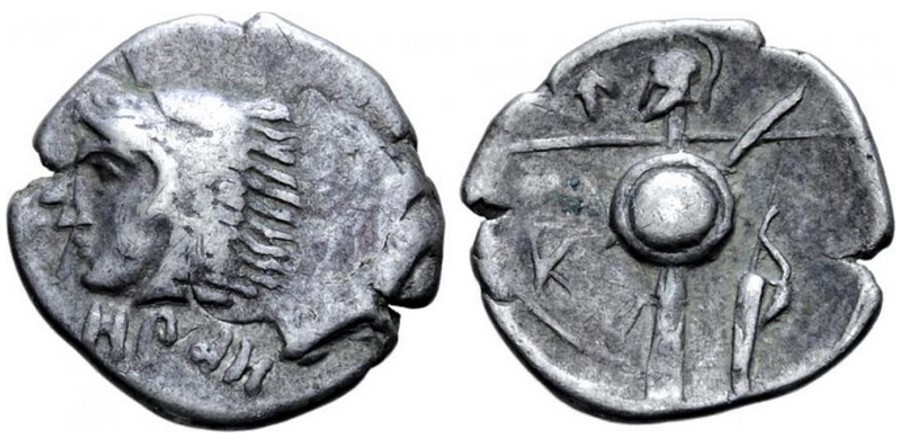3978 - Heracleia Pontica (obol Heracles/trophy) over Heracleia Pontica (Hera/bowcase & club) (Roma Numismatics, EA 71, May 2020, 174)
From SILVER
364 BCE - 352 BCEHPAK
Location/history
| Sale(s)Sale(s) ᵖ: | Roma Numismatics, e-sale 71, 28 May 2020, lot 174 | |
Overstriking coin
Description
| ObverseInscription or printing placed on the obverse.: | HPAK (Greek) Head of Herakles left, wearing lion skin | ReverseInscription or printing placed on the reverse.: | Trophy of arms. In field, K, bow in bowcase. |
Mint and issuing power
| MintIdentifies the place of manufacture or issue of a numismatic object.: | Heracleia Pontica | Ancient regionAncient region. | Bithynia | Modern countryModern country: Turkey | AuthorityIdentifies the issuing power. The authority can be "pretended" when the name or the portrait of X is on the coin but he/she was not the issuing power. It can also be "uncertain" when there is no mention of X on the coin but he/she was the issuing power according to the historical sources: |
Chronology
| FromIdentifies the initial date in a range assigned in a numismatic context. 364 BCE toIdentifies the final date in a range assigned in a numismatic context.. 352 BCE | Classical 480-323 BC |
Physical description
| MetalThe physical material (usually metal) from which an object is made.: Silver |
WeightWeight of the numismatic object (in grams). in grams: 0.770.77 g <br />770 mg <br /> | DenominationTerm indicating the value of a numismatic object. Examples: tetradrachm, chalkous, denarius.: obol |
AxisDescribes the directional relationship between the obverse and reverse of a numismatic object.: 1212 mm <br />1.2 cm <br /> |
| DiameterDescribes diameter of an object (in mm).: 1212 mm <br />1.2 cm <br /> | |||
References
| Coin referenceReference of the Coin: | Coin series referenceReference to coin series study: | SNG BM Black Sea1SNG BM Black Sea, no. 1593, HGC 72HGC 7, n° 477 |
Overstruck type
Description
| ObverseInscription or printing placed on the obverse.: | ΗΡΑ[ (Greek) Head of Hera-Tyche to left, wearing turreted crown | ReverseInscription or printing placed on the reverse.: | Goryt and club. In field, letter or symbol. |
Mint and issuing power
| MintIdentifies the place of manufacture or issue of a numismatic object. ᵖ: | Heracleia Pontica | Ancient regionAncient region. ᵖ | Bithynia | Modern countryModern country: Turkey | AuthorityIdentifies the authority in whose name (explicitly or implicitly) a numismatic object was issued. ᵖ: |
Chronology
| FromIdentifies the initial date in a range assigned in a numismatic context. 364 BCE toIdentifies the final date in a range assigned in a numismatic context.. 352 BCE | Classical 480-323 BC |
Physical description
| DenominationTerm indicating the value of a numismatic object. Examples: tetradrachm, chalkous, denarius. ᵖ: | obol |
References
| Coin type referenceReference to coin series study ᵖ: | SNG BM Black Sea1SNG BM Black Sea, no. 1592, Hoover 20123Hoover 2012, no. 476 |
Additional data
| Frequency of overstrikesFrequency of overstrikes: | rare and spread | Level of confidenceLevel of confidence of the identification: | sure |
| RemarksRemarks: | |||
References
- a b Price, Martin J. (1993), Sylloge Nummorum Graecorum, Great Britain, Volume IX, British Museum, Part 1: The Black Sea, London, [132] p. : ill. ; 31 cm.
- ^ Hoover, Oliver D. (2012), Handbook of Greek Coinages. 7. Coins of northern and Central Anatolia - Pontos, Paphlagonia, Bithynia, Phrygia, Galatia, lykaonia, and Kappadokia (with Kolchis and the Kimmerian bosporos), Lancaster, lxxxii, 352 p. : ill. ; 23 cm.
- ^ Hoover 2012

